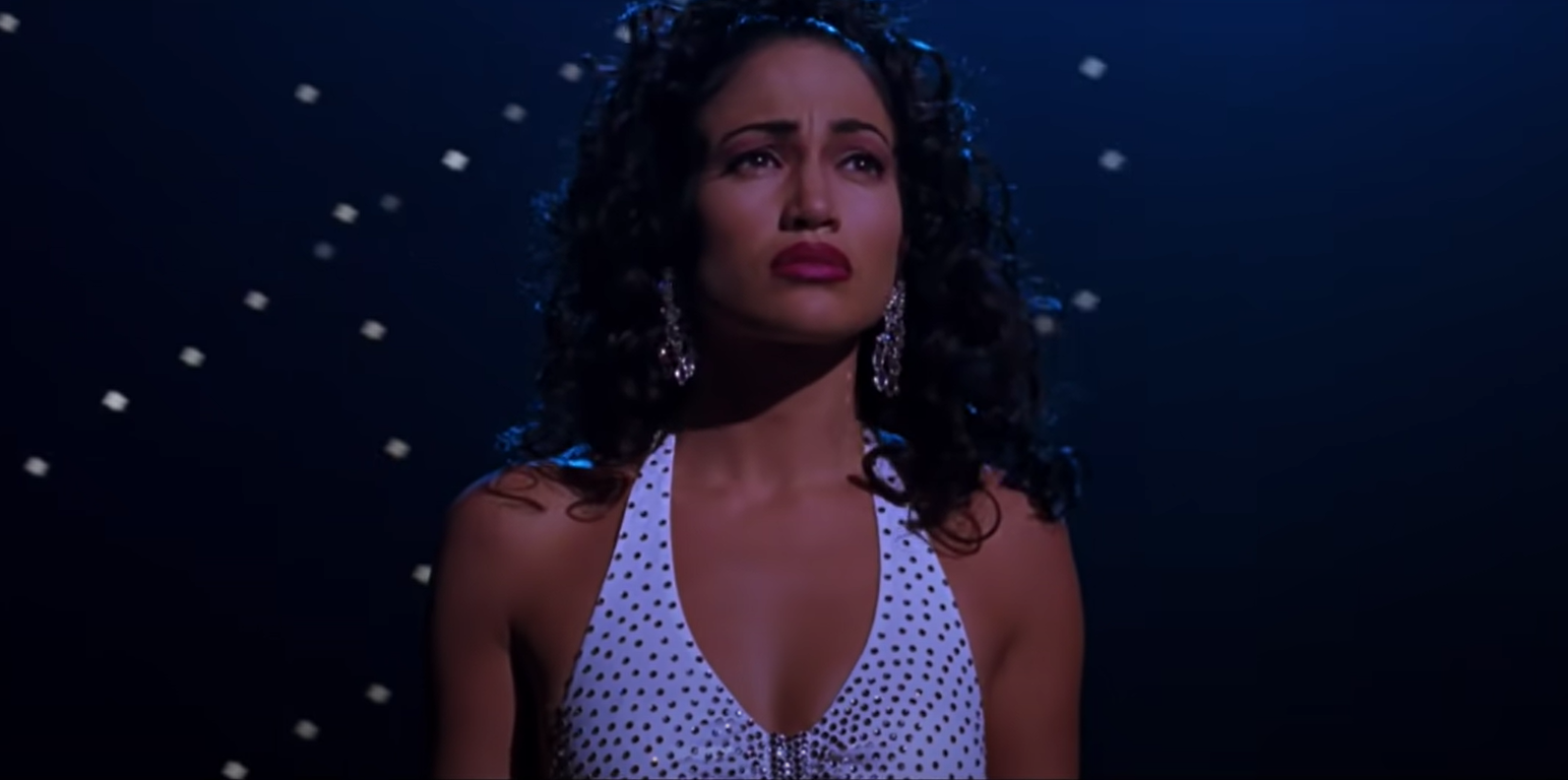"Snatching trophies? I am a trophy." Trixie Mattel: Moving Parts
World-famous drag queen Trixie Mattel shares a year of her life with the world in this vulnerable and uplifting documentary.
The story of Selena, possibly the most iconic Tejana singer in recent memory, returns to the screen—but this time a much smaller one with Selena: the Series. This biographical drama series details Selena Quintanilla’s incredible life as a Tejana music star before her tragic murder in 1995. The series aimed to, as said by one of the directors (Hiromi Kamata), “refresh people’s memory and introduce her to new generations in a very powerful format, which is the series, gives you the freedom and time to really develop a character and develop a dramatic arc throughout the story.” Unfortunately, I feel this series under-delivers this goal.

I was interested to see the series format take on a music biopic because, as stated by Kamata, a series grants more time for complex character development. But Selena: The Series mismanaged that time by providing too much biographical summary. The series literally begins with Selena’s birth, then speeds through the Quintinella family’s childhood within the very first episode. The next eight are devoted to their rise to fame, much of it taking place on the tour bus.
I hoped the series format could avoid the formulaic ruts that music biopics tend to fall into and focus on getting to know our subject, yet even with all this extra time allotted, little is devoted to Selena herself. We see Selena more as a sideline character. Most of the conflict really resides in the family band dynamic split between A.B.’s songwriting and fatherhood, Suzette’s initial resistance to drumming and her love life, and finally Selena’s father Abraham’s domineering micromanagement of the band, who in real life took part in every production about Selena before and after her death, except this Series. Perhaps because of his absence in the production, the series portrays Abraham much more negatively than previous depictions.
During Selena’s career, Abraham was the motivating force in the formation of the band, as well as the main proprietor of the band’s image. He carefully created a narrative that would resonate with the Mexican and Mexican American communities, especially the working class and Catholic demographic. Scholar Luis Placenia has dubbed this narrative “‘the Selena morality play,” in which the centrality of the family is emphasized heavily. The children are obedient, work hard for the betterment of the family, adhere to Abraham as the head of the household, and their hard work pays off despite any ethnic or gender discriminations. Selena’s lyrics were always wholesome, romantic stories about heartbreak, her faithfulness, unrequited love, or dancing. “Never vulgar,” as Abraham has often said. Selena’s family-friendly image, as well as her natural talent in charisma, proved vital to her success.
Abraham in this series is not as interested in the latter, however. In this series, he is tough, prideful, and a little unfeeling. He pressures the kids into forming a band and then lays on the pressure: if we don’t succeed we don’t eat. Although this may be more true to life, it is kind of unappealing to watch, because at the same time the series wants us to like him as a character. In the 1997 film, Abraham’s uncompromising nature is given more light. The beginning of the film shows us a flashback of a young Abraham facing racial discrimination during his Los Dino’s career; he’s run off stage when the audience discovers the band is not white and gets cut gig payments for the same reason. This history becomes the catalyst for why the success of his children’s music career matters to him emotionally, not just because it pays the bills. It also further cements why Selena speaking to her own community in Spanish is so valuable.
In the series, Abraham just states plainly at the dinner table that “playing music is a privilege and it gave [him] some of the best times of [his] life, and [he] wants [them] to have that too”. He later describes the importance of singing in Spanish, which doesn’t have the same emotional weight when we don’t understand Abraham’s past. In the film too, Abraham believes in the kids’ talent: he emphasizes that Selena is special and has the potential to be a star, and it’s very endearing. The series doesn’t have that. Instead, Abraham tells them over and over to work hard, then work harder. Once and a while he gives little trite pep-talks about being yourself or don’t take no for an answer, or… uh, working hard.
These moments that are supposed to make us appreciate Abraham’s guidance seem tired, and are later undercut with his cartoonish outbursts, like one scene where he scolds the bandmates for having a few beers after the show. In between some dry scenes about the record company boxing them into the Tejano market, A.B.’s baby, and Suzette being asked on a date, we are treated to Selena’s secret romance with the guitarist Chris whom Abraham disapproves of because he “knows his type.” This should be the juiciest moment of the series, but sadly their “romance” is devoid of chemistry and has little time to develop before Abraham kicks Chris off the tour bus when he discovers their “Amor Prohibido,” leaving us with a cliffhanger for season two. Unfortunately, it just comes a little too late and leaves little to be desired. I will however give the series credit for historical accuracy, as well as representing aspects of the “Selena morality play,” which is essential to a story about Selena.

The Selena film in 1997 pretty much adheres to the biopic formula. It starts with her childhood, moves to the formation of Selena y Los Dinos, and so on. Of course, the ending is, sadly, much different — as we all know her unexpected murder cut her career tragically short. Selena (1997), too, includes a conflict between Abraham’s loving yet micromanaging nature of the band, but positions that in importance over the conflicts with the record execs. Mainly, Abraham takes issue over her revealing outfits and then later towards her romance with Chris — which in both instances she stands up for her own self-expression and for her own wants, unlike in the series where she just passively follows the direction of her father. I think it works because first there is chemistry between these characters, and second the film hones in on Selena’s wants and needs and her relationship with her fans. It’s a stronger film because it shows us that Selena represented so much more than just a popular Spanish-language singer. She spoke directly to working-class people, conjuring up images of dance parties, beat-up cars, and lost or unrequited love. When Selena performs, she gazes out at her fans and connects with them. It’s powerful, and it’s why she was so universally adored.
There is no greater measure of Selena Quintinella’s impact than the outpouring of grief from her that followed the news of her death in 1995. This grief continues to permeate, especially for the Mexican and Mexican-American community, for Selena represented so much more to them than your average Tejana singer. From her untenable singing talent, magnetic dancing capabilities, and incredible onstage and offstage charisma, it’s understandable why Selena’s real-life story makes for such an appealing subject for two different biographical dramas. This is why it pains me to see such a disservice to her story. Selena: The Series stretches out her story and calls attention to the most unremarkable parts. As we would expect, the heart of the story should be, without a doubt, Selena.
If you are a Selena fan, I can’t recommend this series, and if you are new to her I would suggest instead watching the 1997 film if you want to know her story. And if you want to see Selena in her purest form, watch her very last performance at the Astrodome in 1994.
(This article was originally published by Isa Maginnis on Medium.)
Related lists created by the same author
World-famous drag queen Trixie Mattel shares a year of her life with the world in this vulnerable and uplifting documentary.